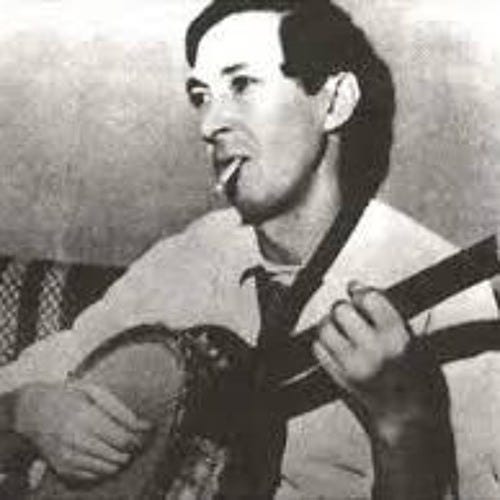FARSANG Profiles: Arkady Severny
Dan Addleman relates the life of the censored Soviet folk singer and criminal balladeer who recorded over 80 albums of outlaw music
When you begin to write an article, it’s generally accepted wisdom that you should consider, at the outset, why you are writing it, or how you came across the topic. I can’t actually remember how I first encountered Arkady Severny. Maybe through our sinisterly omniscient algorithms, or perhaps one of the many self-congratulatory muso’s I’ve inexplicably socialised with over the years. A friend of mine once told me that similarly jarring men and Spotify suggestions had begun to become her only sources of discovering new music, prompting “Fuckboys & The Algorhythm” to be added to a never-ending list of potential band names. Regardless, I knew nothing of this slightly more dishevelled Serge Gainsbourg look-a-like who sounded like an energised and Eastern European Leonard Cohen, but an obsession both admirable and pathetic had begun
Аркадий Северный - Голубое такси
The first thing that strikes you when you hear this man’s music is his incredible voice: a gravelly, cigarette-induced growl that drips with idiosyncratic charisma. One of the benefits of listening to music sung in a language you don’t understand is that you listen more holistically to the vocal itself, unbothered by trying to establish lyrical understanding, and Severny’s is full of personality and theatricality. Just a verse into one of his ballads, such as the atmospheric “Blue Taxi” attached above, and he is instantly the loveable rogue, the attractive outlaw, crooning away at the piano in the corner of some wild but homely imaginary bar somewhere far away that is cold and chaotic. Severny is an undeniably dubious yet well-meaning uncle entertaining the room at a Christmas celebration far more exciting than your own.
And then there’s the music - East European folk that is not unlike the “gypsy jazz” of Django Reinhardt, and the more recently self-styled “gypsy punk" of the brilliant Gogol Bordello. Acoustic rhythm guitars or waltzing basslines often provide the bedrock for piano - sometimes early keyboard - or violin leads that crescendo in volume and accelerate in tempo - it’s truly infectious music that I’d recommend to anyone, especially if you work in film or TV and happen to be scratching around for a great soundtrack. We all start off with preconceptions and judgements about genre. I used to hold many, such as that metal is for sweet but misguided people who love rock music unconditionally. Another was that folk music was boring dross exclusively for overly sincere types who ought to shower and breed outside of their families more. Whatever the reality of this hygiene/inbreeding situation, it’s a genre that is anything but, especially when applied to folk traditions outside of the UK; it can be riotous, joyful, and radical.
Even if, like me, you’re not familiar with Russian, an idle Google Translate investigation can reveal that the lyrics match the music behind them. Take the infectious delight “Mi Anarhisti” (“We’re Anarchists”) attached below. The upbeat jig, with bouncy chords on the piano and emotive, searing violin leads elevate Severny’s characterful singing. A rough translation of the opening two verses goes as follows:
“We are anarchists - cheerful people, for ours is the freedom of the road /
Our own rules, our own laws, anything else - I don't care! /
If I had a hat, and a woollen coat, and I didn't have a headache /
If I had vodka, just a sip of vodka, anything else - I don't care!”.
You could roll your cynical, jaded eyes at these lyrics, but I challenge you to read them while listening to this brilliant upbeat tune and not feel stirred into a little revolutionary vigour, no matter how conservative you might be. If you played Mi Anarhisti enough to Peter Hitchens, you’d probably even have him pulling down the odd statue and getting a Prince Albert, albeit amongst an incoming wider psychological breakdown.
Little is known about Severny’s origins. Most reports have it that he was born Arkady Dmitriyezich Zvezdin in the town of Ivanovo, near Moscow, in 1939. Severny had a near photographic memory from early childhood, learning and performing thick songbooks of traditional Russian folk music in their entirety long before his career began. Moving to Saint Petersburg, then Leningrad, in the late 1950’s, Severny’s first recorded music appeared in 1963. This already took the form of “prison songs”, with lyrics that centred on criminality, lovable rogues and outlaws. In 1967, Severny released his first full album,, which producer Rudolf Fuchs interestingly decided to present in the form of a hoax, specifically a non-existent radio programme. Allegedly broadcast on Soviet airwaves, Severny performed prison songs on the radio at the request of the programme's listening audience. This subversive, “fake” radio programme turned out to be a major success, due to the provocative nature of the songs supposedly performed on Soviet radio. This rebellious presentation of Severny’s work allows us to examine the reasons for his use of a pseudonym, adopted as a matter of both style and necessity.
Severny literally translates as “Northern” in Russian. Many of the Soviet Union's gulags were located in the north of the country, perfectly fitting Severny's carefully cultivated image as a prison singer. This pseudonym also served as a cover, since under various totalitarian Soviet regimes one could be sent to prison, or indeed receive a death sentence, for giving underground concerts, or creating art that so wilfully celebrated criminality and noncompliance with the state. Operating under this relative anonymity, Severny wrote and memorised thousands of folkloric songs, and the 1970’s proved to be his incredibly prolific period of huge popularity across the country, right up until his death from a haemorrhage in 1980 at the age of 41. Above all, Arkady Severny represented a semi-fictional “outlaw”, a conduit through which listeners could find an illicit alternative to the authoritarian monoculture of Soviet life in the 1960s and 70s.
It is also worth noting the prominence of “Old Odesa” in Severny’s lyrics, as a space to explore such themes of rebelliousness. In Russian folklore, the Black Sea port has long been the place to situate tales of criminality; the stories themselves often date back to the 19th Century. You can hear the rousing “Eh, Odessa!” attached below - the quintessential Severny song about the city. However, he reportedly would shout interjections in live performances along the lines of “in Odesa…” and “Back when I was in Odesa…”, with much of his audience presuming he was from the city.
In Boris Dralyuk’s introduction to a recent collection of Isaac Babel’s “Odessa Stories”, he talks of how the theme of the “blatnaya pesnya” (“criminal song”) was initially popularised by Leonid Utyosov (1895-1982), one of Odesa’s proudest citizens and reputedly Stalin’s favourite performer. The assumption is clearly that Utyosov somewhat predated Severny, although evidently to less popular appeal, save for Uncle Joe. I’d recommend Babel’s stories: vivid tales of sex and violence in a town of Yiddish gangsters and radicals, often with a moral, even parable-esque undertone, which place the subject matter of much of Severny’s music in a fascinating cultural context. Dralyuk writes that “no author has done more to solidify the myth… to raise Odesan lore to the level of art, than Isaac Babel”. Severny’s need for a pseudonym may well be underscored by the fact that Babel, perhaps his literary equivalent, fell victim to Stalin’s terror in 1940.
Such wistful romanticisation of a time and place one has a connection to, but is not actually from, is a hallmark of much poetic inspiration. Take the late, great Shane McGowan, Pogues frontman and London Irishman. McGowan’s lyrics, a rephrasing of old Irish folk traditions in a 1980’s post-punk landscape, were inspired, violent and beautiful. In many ways it’s inconceivable for someone who actually grew up amongst the mundanity of the country itself to have such a romantic and vivid poetic image of the Emerald Isle. I’d be a hypocrite to call McGowan something of a Plastic Paddy without acknowledging I’m far worse of a culprit - McGowan’s parents were both Irish, while just a single side of my family is. If his level of Plastic-Paddy-plasticity is equatable to an ugly used vape bobbing around in County Wicklow’s Glendalough, mine is to a cheap but sizeable sex toy getting fatally rammed in the throat of a seagull on the stunning South West coast of Cork. But his ability to summon such fervour, such artistic adulation for Celtic culture, seems crucially tied in with his relative geographical distance but inherent, blooded connection to it.
The same can no doubt be said of Severny and Odesa: a Brezhnev-era Soviet singer who had a lyrical obsession with the folklore of an old-world, largely Jewish city. Amongst the bleakness of 20th century Soviet communism, how is one best equipped to lyrically discuss the wildness and violence of your surroundings in a way that could entertain the masses, as Severny did? Through a depressing description of what you see when looking out of the window, or the glorious fantasy of some long-forgotten, mythologised city of old? The latter is what Severny opted for, and was doubtlessly preferable for his large Soviet audience. Sometimes poetic realism is best achieved through an immersion into the mythological, and Severny was no doubt wise to this.
Enough about Arkady - why am I trying to write this article? I suppose the music in question feels, albeit in a tenuous respect, like it has some personal resonance. I’m originally descended on one side from the Eastern European shtetl Jews, who so much of Severny’s “blatnaya pesnya” subject matter was based on. All writing about art really says far more about the writer than it ever does about its subject. With this and my tenuous link in mind, when I listen to Arkady Severny’s stirring Шарабан мой, американка (“My Charabanc, American”) I feel an overwhelming urge to drink something strong, before fantasising about being cast in a surprisingly sexy remake of Fiddler on the Roof, an impressive beard on my face and a wild look in my eye, as I rasp gutturally about “tradition” in a performance that would see me permanently denied entry from a Starmer-era-Labour Party. My own Jewish connection would be deemed irrelevant - they just would not be having it.
So there we are. The more critical of you may have come to the end of this profile and noticed that it’s somewhat lacking in an investigation of this wilfully obscure figure. The article has come to an end and still no purpose has been convincingly fabricated. I won’t apologise, but instead leave you with the brilliant Годы мчатся (The Years are Rushing By) and tell you to look out for any Fiddler on the Roof remakes. Hopefully the stars will align and we can get Tracey-Ann Oberman to play my headstrong, hands-on-hips wife. Spasibo.









